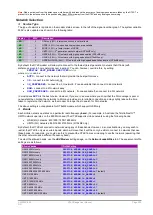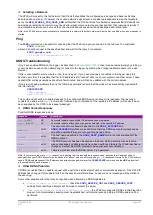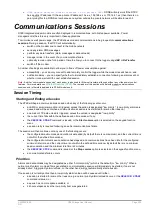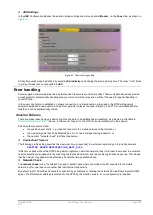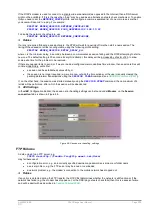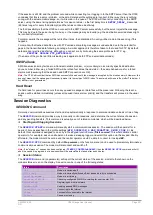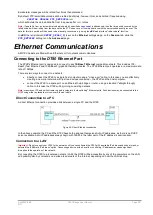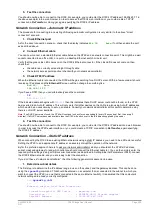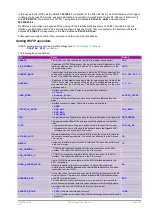
UM-0085-B09
DT80 Range User Manual
Page 228
RG
Listing Session Queues
When an alarm or unload occurs, the resulting message or data file is placed in a queue. The
DT80
uses four separate
queues:
•
one for SMS alarm messages
•
one for email alarm messages
•
one for email unload data files
•
one for FTP unload data files
Once added to a queue, the message or file will stay there until either:
•
it is successfully transferred to the FTP server, or the SMTP server, or to the mobile network (for SMS), or
•
the message is deleted following a number of unsuccessful retries, as detailed in Error handling (P232).
The
SESSION LIST
command allows you to see the contents of each queue. For example:
SESSION LIST
SMS Alarm Queue (1/6):
2011/04/13,16:17:10: +61400123456, 'alarm: temp=49.3',
–
prio:norm, retry:0 (2011/04/13,16:17:10)
Email Alarm Queue (1/13):
2011/04/13,16:17:10: barney@zcorp.com, 'alarm: temp=49.3', iface:modem,
–
prio:norm, retry:0 (2011/04/13,16:17:10)
Email Data Queue (0/13):
FTP Data Queue (2/12):
2011/04/13,16:11:11: ftp.zcorp.com, /bj/000_20110413T161110.CSV, iface:modem,
–
prio:low, retry:3 (2011/04/13,16:44:12)
2011/04/13,16:16:53: ftp.zcorp.com, /bj/001_20110413T161652.CSV, iface:modem,
–
prio:low, retry:0 (2011/04/13,16:16:53)
Modem SMTP server connect retry:1 (2011/04/13,16:18:55)
(Long lines have been split)
In the above example you can glean the following:
•
There is one pending SMS alarm message. The message was generated at 16:17:10 and is directed to the
indicated number, with the message text as shown. Priority is "normal", which means that a session would have
been started as soon as the message was queued (if one was not already active). The retry count is 0,
indicating that the DT80 has not yet attempted to send the message. The next attempt is scheduled for
16:17:10, i.e. it is due now.
•
There is one pending email alarm message, which was generated at the same time as the SMS and contains
the same message. It has not yet been attempted. It will be sent using the modem interface (the session queue
is used for both modem and Ethernet alarms and unloads).
•
There are no pending email data unloads.
•
There are two pending FTP data unloads. The first has failed three times so far, with the next retry due at
16:44:12. The second FTP transfer has not yet been attempted. These unloads are designated "low" priority, so
they would not have caused a session to be immediately started.
•
There was a problem connecting to the SMTP server. This will be retried at 16:18:55.
Clearing Session Queues
The
SESSION CLEAR
command will clear all pending transfers, i.e. it will empty all four session queues. Use with care!
Note that if this command is entered while a file or message is being transmitted then that item will not be deleted – it will
be allowed to complete. If you want to cancel the transfer half way through then first abort the session using
SESSION
STOP
, then use
SESSION CLEAR
.
Forcing Retries
The
SESSION RETRY
command will cause a session to be started immediately (if one is not already active) and all
pending items will be retried. This is handy if you have manually fixed a problem or setting that was causing
transmissions to fail. (Of course, you could also just wait until the scheduled retry time comes around).
Signal Check Mode
The
SESSION SIGNAL
command (
Check signal
on function menu) can be used to provide a continuously updated
readout of the signal strength and quality. This can be used to optimise antenna placement, for example.
See
for more information.







